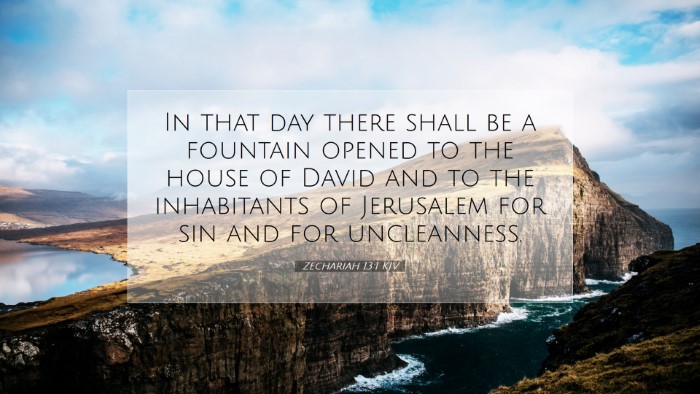Old Testament
Genesis Exodus Leviticus Numbers Deuteronomy Joshua Judges Ruth 1 Samuel 2 Samuel 1 Kings 2 Kings 1 Chronicles 2 Chronicles Ezra Nehemiah Esther Job Psalms Proverbs Ecclesiastes Song of Solomon Isaiah Jeremiah Lamentations Ezekiel Daniel Hosea Joel Amos Obadiah Jonah Micah Nahum Habakkuk Zephaniah Haggai Zechariah MalachiZechariah 13:1
Zechariah 13:1 KJV
In that day there shall be a fountain opened to the house of David and to the inhabitants of Jerusalem for sin and for uncleanness.
Zechariah 13:1 Bible Commentary
Commentary on Zechariah 13:1
Verse Context: Zechariah 13:1 reads: "In that day there shall be a fountain opened to the house of David and to the inhabitants of Jerusalem for sin and for uncleanness." This verse is a profound declaration of hope and divine cleansing, situated within the eschatological vision of Zechariah's prophecies.
Historical Context
Zechariah prophesied during the post-exilic period when the Jewish people were returning to Jerusalem after captivity in Babylon. At this time, the nation was in need of restoration not only of their physical kingdom but also of their spiritual lives.
Exegetical Insights
Matthew Henry: Henry emphasizes that “the fountain opened” represents the provision God makes for spiritual renewal. He interprets this metaphor as a source of cleansing where individuals can come for redemption. This fountain, according to Henry, signifies the grace that God generously pours out upon His people, cleansing them from their guilt and restoring their spiritual health.
Albert Barnes: Barnes provides a detailed analysis of the term “fountain.” He notes it refers specifically to a source of perpetual refreshment. The imagery conveys the idea of a never-ending supply of grace that flows from Christ, who fulfills this promise as the ultimate source of redemption. Barnes also highlights the accessibility of this fountain; it is “opened” signifying that it is available to all who seek it, particularly the house of David and the inhabitants of Jerusalem.
Adam Clarke: Clarke delves into the theological implications of the fountain. He argues that the cleansing provided by this fountain extends beyond mere ritualistic purity; it speaks to a full restoration of the soul. Clarke connects this verse to New Testament concepts, particularly the idea of Jesus as the Lamb of God whose sacrifice makes atonement for sin. He stresses that this offering cleanses believers from all unrighteousness and emphasizes the holistic healing available through faith in Christ.
Theological Implications
This verse is a critical pivot in understanding divine grace in the Old Testament context. It foreshadows the New Covenant and the redemptive work of Christ. Each commentator reveals different layers of meaning regarding cleansing from sin:
- Redemptive Hope: The opening of the fountain indicates a fresh start for those who acknowledge their sin.
- Accessibility: The invitation to the house of David and the inhabitants of Jerusalem signifies an inclusivity in God’s redemptive plan. It emphasizes that both leaders and common citizens are offered the same grace.
- Cleansing from Guilt: The dual mention of “sin” and “uncleanness” highlights the thoroughness of God’s cleansing, addressing both moral failures and ceremonial impurities.
Application for Believers
Spiritual Cleansing: Believers today must recognize that this fountain is not merely a historical reference but an ongoing reality in their spiritual lives. The invitation still stands; coming to God for cleansing involves acknowledging one’s sin and need for His grace.
Hope in Restoration: Pastors and leaders are granted a profound message of hope to share with their congregations. No matter how deep the stain of sin, God has provided a way to restore and heal. This passage should encourage Christians to trust in God’s mercy that is perpetually available.
Community of Grace: As Zechariah addresses both the house of David and the inhabitants of Jerusalem, modern-day churches are reminded of their calling to extend this grace to all members of their communities. Equipping congregations to understand their role as conduits of this cleansing fountain becomes central to ministry.
Conclusion
Zechariah 13:1 is a rich wellspring of theological reflection and practical application. The insights from Matthew Henry, Albert Barnes, and Adam Clarke serve to deepen our understanding of God’s grace. They remind us that the cleansing fountain continues to flow, offering redemption to everyone who turns to the Lord in faith. Pastors, students, and scholars should engage with this text deeply, reflecting on its implications for their lives and communities.


